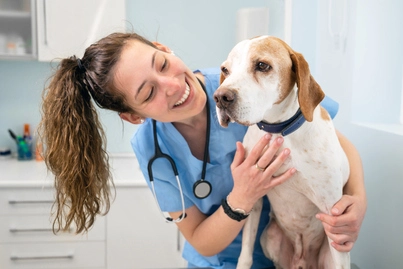Seeing your dog in their twilight years is a bittersweet thing. They may slow down, but their attachment to you is stronger than ever.
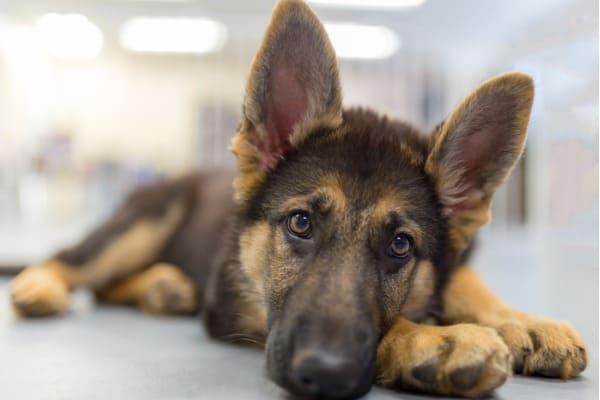
So when you notice changes in their physique, it’s understandably concerning.
The good news?
A lot of these changes are normal in old age.
You may be worried about seeing your older dog lose weight and muscle mass atrophy.
Knowing how to recognize the signs of aging versus atypical dog health issues is essential.
If knowledge is power, your dog’s vet is your closest ally. They can find out exactly why your dog seems to be shrinking.
Connect with a verified veterinarian in minutes. No waiting for appointments or office hours. No high fees. Your pet's health made convenient and worry-free.
Once you can identify why your dog is losing weight or muscle, you can take action.
Muscle atrophy in dogs is surprisingly common – it’s not just a human ailment.
In elderly canines, there are ways to counteract the effects and give your dog their best life – even in old age.
We’ll go over what exactly can be done for your old dog if they suffer from muscle atrophy and weight loss.
We know dogs don’t live half as long as we want them to.
But don’t forget weight loss in older dogs doesn’t always mean the beginning of the end – it’s often far less severe.
The Likely Culprits
To understand what is causing your dog’s weight or muscle loss, you first need to consider the most common triggers for the issue.
While all dogs can experience weight loss, it happens more frequently in seniors.
Age in General
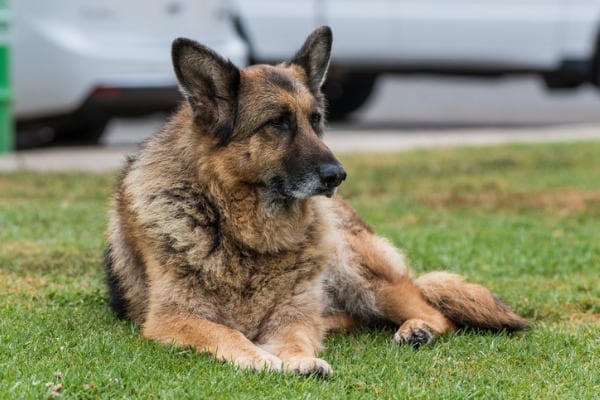
A decrease in muscle mass nearly always affects old dogs – so consider their age. But what makes a dog a senior citizen?
Aging in dogs isn’t as simple as it is in humans because of the unique characteristics of each breed.
Several factors come into play, including your dog’s size and genetic makeup.
Toy breeds generally have longer lifespans and often aren’t considered senior until ten years of age or even later.
“Giant” breeds can be considered geriatric by five or six years old.
Here’s an example…
An eight-year-old Pomeranian and an eight-year-old Great Pyrenees would not have the same biological age, despite being the same age chronologically.
From a physiological standpoint, a twelve-year-old Pomeranian would be more similar to the Great Pyrenees.
Knowing how your dog’s breed ages is the first step to identifying potential age-related issues.
Understand when you can expect to see signs of old age in your dog based on their breed and size.
But what if you have a mixed-breed dog?
The general rule most vets abide by is that medium to large dogs aged 7-8 can be considered senior citizens.
A common method of calculating your dog’s age in human years is to multiply their age in years by seven (with the first two years being more like 10:1).
But that might not be entirely accurate – especially when you factor in the differences in breeds.
A ten-year-old small dog is roughly equivalent to a 56-year-old human. In a large dog, ten years is closer to 66 human years.
Consider the changes humans face at that age, and you can understand why your dog might be slowing down.
If your dog reaches their teens, you can expect to see more weight-loss-related issues.
The Wrong Diet
Muscle atrophy in dogs can be a result of their food. Improper diet and elderly dogs go hand in hand.
Just like humans, dogs have different nutritional requirements throughout their lives.
While the wrong food can cause weight loss at any age, elderly dogs are at a higher risk.
We feed puppies a specific puppy food formula; older dogs also have different needs than adults in their prime.
Higher protein and vitamin-rich dog food should be fed to seniors. “Junk” food isn’t good for dogs of any age, but it can cause a whole new set of issues in old dogs.
Avoid sharing human treats regularly – save them for special occasions.
Something Potentially Serious
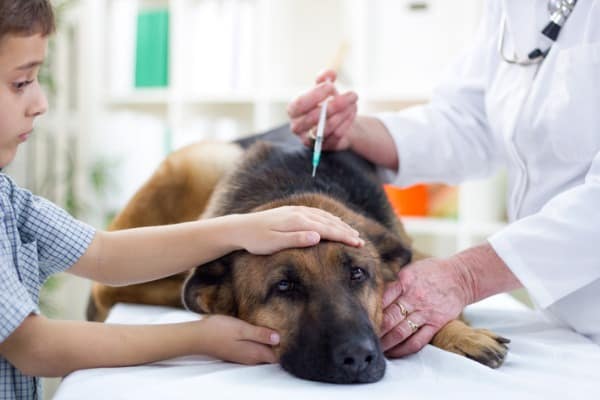
Since muscle atrophy and weight loss can indicate a more serious problem, having your vet help you narrow down the cause is a good idea.
Cancer and autoimmune diseases in dogs can be indicated by both muscle and weight loss.
Weight loss in older dogs can have no cause other than age – but there is a chance it could be a sign of something else.
Since many diseases which cause weight loss are more common in older dogs, eliminating a serious issue as the cause is essential.
Your vet can tell you what you should test for and if your dog’s weight loss is part of them getting older.
My Older Dog Is Losing Weight – Now What?
Narrow Down the Cause
It can be tricky to pinpoint if your dog is dropping pounds.
We see our dogs every day, so sometimes it’s not clear if we actually see a change in their body or if we imagine it.
If you suspect any weight loss even if your dog is eating, start weighing your dog regularly for a few weeks.
Larger dogs aren’t known for cooperating on the scale (honestly, who can blame them?), but you can also measure them to track their size.
Losing pounds or inches when there has been no change in their routine is worrisome. Be sure to keep an eye out for other symptoms, as they can signal something that requires a vet’s care.
For example, diabetes can affect older dogs, and weight loss is a primary symptom. Diabetic dogs will show an increase in thirst and appetite.
If the weight loss is accompanied by diarrhea and vomiting, they could be suffering from Addison’s Disease.
Parasites can also produce very similar symptoms.
Senior dogs’ teeth will deteriorate the older they get. Infected, painful teeth and gums could cause a decrease in appetite and lead to weight loss.
The best thing you can do is rule out any serious disease that requires medical treatment.
Some things don’t have helpful home remedies, and attempting to treat them at home could actually shorten your pet’s life.
Older dogs should have regular appointments with the vet so that these scary conditions can be caught early on.
Once you’re sure about the cause of their weight loss, there are steps you can take at home to help your dog from wasting away.
Negate the Effects
Diabetes
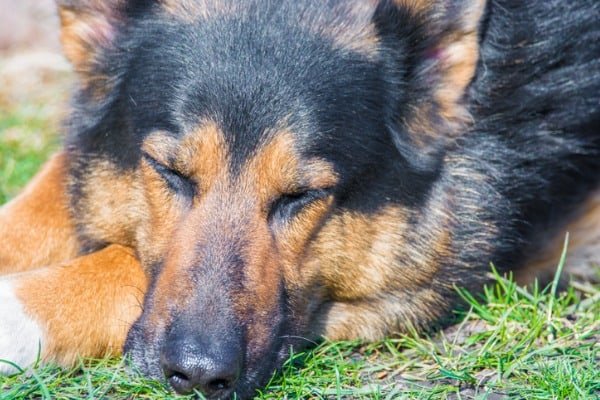
Though not necessarily brought on by your dog having a sweet tooth, obese dogs are at a higher risk for developing diabetes.
Weight loss in an overweight dog might not be apparent at first, but it can become very pronounced.
If your dog is diabetic, insulin can be used as a treatment, just like in humans.
This treatment is something that will need to be administered for the rest of your dog’s life.
A vet can teach you how to administer your dog’s insulin injections, typically twice daily. They will need to be given close to mealtimes, or the effects can be dangerous.
It’s safer to feed your dog before giving them their insulin since they don’t understand they must eat afterward.
They could refuse food for many reasons and become ill as a result. Insulin and adjustments in diet show promising results in diabetic dogs.
Managing the disease will help with the side effects, including weight loss.
Addison’s Disease
A typical Addison’s disease diagnosis can be treated with oral medication.
Advanced Addison’s might require periodic hospitalization, where a vet can administer treatment.
If caught early enough, oral treatment is enough to keep your dog from feeling the side effects of Addison’s Disease.
Decreased appetite should return to normal, as well as their weight.
Parasites
This is not an issue unique to older dogs – although they are certainly vulnerable to parasites.
Prevention is easy – anti-parasite pills given monthly are highly effective at preventing parasitic infections.
If your dog does get worms, there are oral medications that can rid them from their body. Once the parasites are gone, your dog’s weight should stabilize.
Disclaimer: treating certain parasites isn’t pretty. Your dog will expel the parasite when they eliminate, and you’ll need to dispose of the result.
We won’t go into the gross details but just know you might not have an appetite for pasta anytime soon.
Gum Disease

Periodontitis sounds like a mouthful – and it is. It’s a mouthful of bacteria, and it could be causing your dog’s lack of appetite.
Your dog will also have unusually stinky breath, red or swollen gums, and yellowing teeth.
Left untreated, your poor pooch will start losing their teeth.
What can you do?
You can help at home by brushing your dog’s teeth regularly, especially as they age.
Specialized dog toothbrushes and toothpaste are available at pet supply stores.
Advanced cases of periodontitis will require professional cleaning at the vet.
Don’t be surprised if they come home a little loopy. Most vets will sedate dogs for this procedure.
Being proactive about your dog’s dental health can be a treat for them – literally.
Special chews are available, which are formulated to prevent oral disease. Keep a look out for pale gums in dogs too.
Unknown Causes
Sometimes age itself can catch up with your dog. Weight loss is not always easily treated.
If there is no clear medical diagnosis to explain your senior dog losing weight, changing their diet can help.
Entice them with wet food, or experiment with a vet-approved raw diet.
Don’t Ignore It
Obviously, ignoring any unusual symptom in your dog is a bad idea.
Finding the root cause of weight loss is the first step.
Treating the causes has benefits beyond keeping your dog at a healthy weight.
Choosing to treat the common reasons behind weight loss in dogs will prolong their life – and keep them comfortable.
Remember that weight loss in old dogs isn’t necessarily cause for alarm.
It may be tough to see, but many causes are just a part of old age.
Muscle Atrophy in Dogs
Another alarming change you might see in a senior dog is the loss of muscle mass.
This video can be informative when we talk about more serious cases.
An athletic dog can seem to deteriorate once they get older.
Weight loss and muscle atrophy often go hand in hand. But the side effects can be slightly different.
Recognize the Common Symptoms
Weakness is one of the first indicators that your dog’s weight loss includes muscle loss.
Is your dog struggling to stand, or they’re flopping down when they want to lie?
Well, their muscles could be thinning. This condition can also come with decreased energy and painful joints.
You might notice your dog feels less “firm” and more “flabby.”
Sometimes, muscle loss is visibly apparent – especially in short-haired breeds.
Ask the Vet
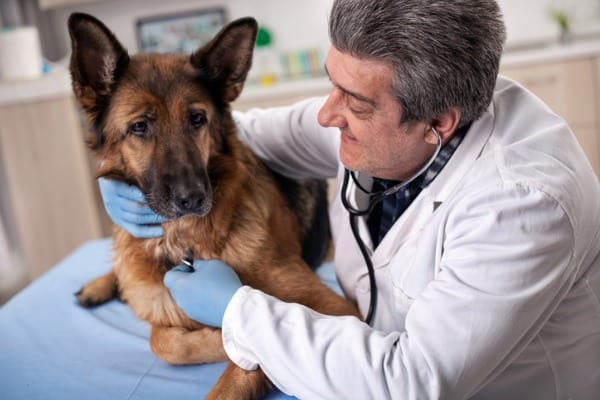
We’ve suggested this a lot – but many causes require a vet’s treatment.
Without medical care, your dog’s quality of life could deteriorate quickly.
For example, muscle atrophy, or myositis, can indicate a serious issue.
It can be an immune response to a precursor of cancer.
Sorry, we have to mention it…
The C-word is scary, which is why it’s essential to catch it as early as possible.
Luckily, these physiological indicators give you a headstart on maintaining your dog’s health.
Myositis can also be a result of an immune disorder. Sometimes, a canine’s immune system can “overload” and attack muscle cells.
And sometimes, it’s just a part of an aging dog. It can lead to other issues, so managing it is a priority.
Muscle Atrophy from Decreased Exercise
Old dogs slow down; it’s a fact of life. Your puppy retriever might not be able to chase the ball for hours on end once they get older.
Joint and Bone Issues
Lack of exercise is often the result of joint pain in elderly dogs. Dogs might seem disinterested in a walk or game of fetch because it just plain hurts.
And let’s face it: who wants to go for a run when every stride is painful?
The truth is, it’s easier to lay around all day when movement is uncomfortable.
But don’t let your dog become a couch potato just yet. Elbow and hip dysplasia, arthritis, and degenerative diseases can all be treated and managed.
Old-fashioned anti-inflammatory medications can be used to decrease your dog’s discomfort.
Glucosamine supplements are also a good option – even before they show signs of joint pain.
Advanced joint issues aren’t untreatable but could require surgical alternatives.
Arthroscopic joint cleaning and even joint replacements are viable alternatives for dogs.
Once your dog is back on their paws, regular exercise is more realistic. And exercise will build back muscles.
Age-Appropriate Exercise
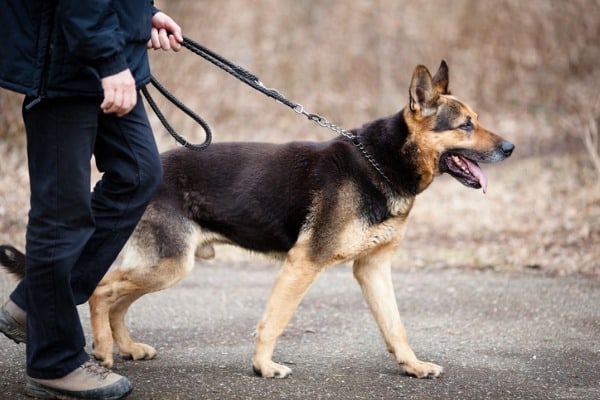
Even when their pain is being managed, older dogs should be handled with care.
This means not overexerting them or putting them in precarious situations.
The bottom line?
Walks and short fetch sessions: yes. Agility courses and strenuous hikes: no.
Overuse of muscles can defeat the purpose of the exercise. Some myositis is a result of too much exercise and improper use.
A vet can help you find the right balance of physical activity for your senior dog.
Breed, weight, and skeletal health are all factors that must be considered.
Hydrotherapy
Easing back into exercise can be tricky territory for fragile older dogs.
Hydrotherapy, or water therapy, is a gentler way to get them the exercise they need.
It won’t be like a water aerobics class for humans, but the idea is the same.
During hydrotherapy, your dog will be exercising in water.
Allowing them to be buoyant takes the strain off painful and deteriorated joints.
It’s especially helpful for dogs with degenerative joint diseases – normal exercise could exacerbate the condition.
There are several types of hydrotherapy. Your dog could take a walk on a submerged treadmill – and no, they won’t need diving gear.
The submerged treadmill will allow their body to be in the water while their head is above the surface.
Just like a regular treadmill, the belt will move, and the dog can walk on it – except it’s underwater.
Hydrotherapy pools are another option for your dog with joint pain. In a controlled environment, your dog can exercise by swimming.
Dogs can even reap the benefits of jacuzzi-style whirlpools.
A warm bath with jets feels great when we’re sore – dogs are no different.
Helpful Diet Changes
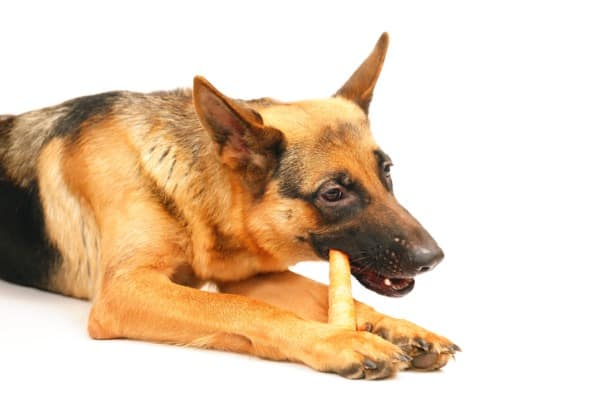
The wrong diet could be worsening your dog’s muscle atrophy. Food high in carbohydrates is a big no-no if your dog loses muscle.
Too many carbs can put weight on your dog, alright. But it’s not the kind of weight gain you’ll want to see.
An overweight dog with a high body fat percentage is susceptible to other health issues.
And they won’t be putting on muscle weight by scarfing down that high-carb dog food.
As a general rule, a senior dog should be eating food that is 24% protein or higher. Avoid starchy foods with high amounts of corn or grain fillers.
If you feed your dog a raw diet, be sure to include foods rich in antioxidants and specific vitamins.
Make sure your dog’s meals include calcium-rich foods, like salmon and greens, that are safe for dogs.
Choline is another substance that is vital to your dog’s muscle health.
Choline can be found in organ meats and spinach – both safe for your dog in the proper quantities.
As always, consult your vet and do your research before feeding your dog “people” foods.
Some foods are irritating or downright dangerous for your dog to consume.
Supplements for Muscle Atrophy
Joint aids and muscle health supplements can pack a punch.
Adding them to your dog’s regimen is an easy way to maintain health and slow the progress of age-related issues.
B vitamins are a superhero for muscle and joint health. B-1, B-6, and B-8 all provide benefits to cellular functions.
Glucosamine supplements are also a wise addition to your senior dog’s routine.
It helps maintain and rebuild cartilage, which is essential to your dog’s joint health.
There’s an upside to this: you won’t need to wrap pills in cheese and engage in a battle of wits with your dog to administer most supplements and vitamins.
Many brands offer them in tasty treat forms.
Senior Citizen Canine
When your older dog is losing weight, the priority is learning the underlying cause.
Your trusted vet can help with that part, and then you can decide the best course of action together.
Old dogs can live a full life, even when they start to slow down.
Weight loss and muscle atrophy are by no means automatically debilitating.
While both can signal to age in general, their side effects can be treated.
There are several options, depending on the underlying cause.
The takeaway: the normal aging process can cause some complications, such as your old dog losing weight and muscle mass.
But proper TLC can extend and enhance your dog’s life, even when that beloved muzzle turns white.

